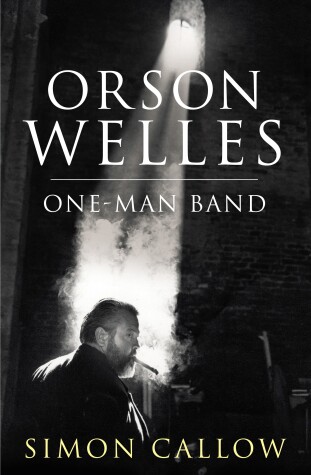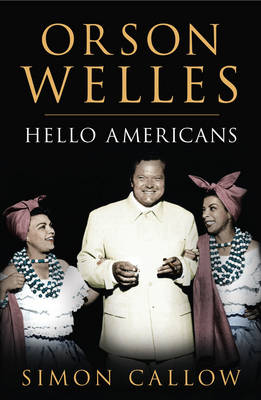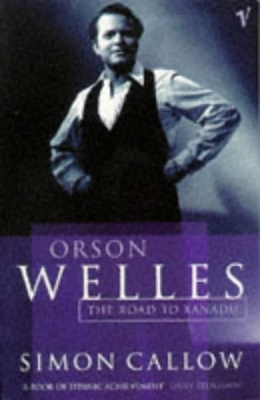Orson Welles Biographies
3 total works
In One-Man Band, the third volume in his epic survey of Orson Welles’ life and work, Simon Callow again probes in comprehensive and penetrating detail into one of the most complex artists of the twentieth century, looking closely at the triumphs and failures of an ambitious one-man assault on one medium after another – theatre, radio, film, television, even, at one point, ballet – in each of which his radical and original approach opened up new directions and hitherto unglimpsed possibilities.
The book begins with Welles’ self-exile from America, and his realisation that he could only function happily as an independent film-maker, a one-man band; by 1964, he had filmed Othello, which took three years to complete, Mr Arkadin, the biggest conundrum in his output, and his masterpiece Chimes at Midnight, as well as Touch of Evil, his sole return to Hollywood and, like all too many of his films, wrested from his grasp and re-edited. Along the way he made inroads into the fledgling medium of television and a number of stage plays, including Moby-Dick, considered by theatre historians to be one of the seminal productions of the century. Meanwhile, his private life was as dramatic as his professional life.
The book shows what it was like to be around Welles, and, with a precision rarely attempted before, what it was like to be him, in which lies the answer to the old riddle: whatever happened to Orson Welles?
The book begins with Welles’ self-exile from America, and his realisation that he could only function happily as an independent film-maker, a one-man band; by 1964, he had filmed Othello, which took three years to complete, Mr Arkadin, the biggest conundrum in his output, and his masterpiece Chimes at Midnight, as well as Touch of Evil, his sole return to Hollywood and, like all too many of his films, wrested from his grasp and re-edited. Along the way he made inroads into the fledgling medium of television and a number of stage plays, including Moby-Dick, considered by theatre historians to be one of the seminal productions of the century. Meanwhile, his private life was as dramatic as his professional life.
The book shows what it was like to be around Welles, and, with a precision rarely attempted before, what it was like to be him, in which lies the answer to the old riddle: whatever happened to Orson Welles?
The reason for the decline of Orson Welles' career is a hotly debated issue, but decline it certainly did. When "Citizen Kane", his first film, opened in 1941, Welles was universally acclaimed as the most audacious film maker alive. But instead of marking the beginning of a triumphant career in Hollywood, the film still regularly voted the greatest ever made proved to be an exception in Welles' life and work. He found it increasingly impossible to function within Hollywood's system. Project after project foundered, either abandoned incomplete - as with his ambitious Brazilian epic "It's All True" - or, as in the case of virtually every other film he made in America, being released in very different form from the one he intended. Finally, in 1947, he left America for Europe where for the best part of twenty years he lived in self-imposed exile, occasionally and briefly returning to stage a play, make a film or shoot a television drama. In close and colourful detail, "Hello Americans" examines the years from "Citizen Kane" to "Macbeth" in which Welles' Hollywood film career came apart.
It offers a scrupulous analysis of the factors involved, revealing the immense and sometimes self-defeating complexities of Welles' temperament as well as some of the monstrous personalities with whom he had to contend. At the same time, the book gives full weight to the almost bewildering range of his activities beyond Hollywood: his serious but doomed attempts to be a radio comedian and stage magician, his flamboyant and financially disastrous endeavour to revive spectacular theatre single-handedly, his newspaper columns, and the political activities into which he so passionately flung himself. And of course the films, as fascinating as they were flawed: "The Magnificent Ambersons", "Journey Into Fear", "The Stranger", and "The Lady From Shanghai". The thread that runs through this apparently incoherent blur of activity is an often frustrated engagement with his native land, its faults, its dreams, its popular arts, and its history. But by 1947, he had said all that he had to say to his fellow citizens; it was Goodbye Americans for two decades of endlessly experimental and innovative but essentially European work.
It offers a scrupulous analysis of the factors involved, revealing the immense and sometimes self-defeating complexities of Welles' temperament as well as some of the monstrous personalities with whom he had to contend. At the same time, the book gives full weight to the almost bewildering range of his activities beyond Hollywood: his serious but doomed attempts to be a radio comedian and stage magician, his flamboyant and financially disastrous endeavour to revive spectacular theatre single-handedly, his newspaper columns, and the political activities into which he so passionately flung himself. And of course the films, as fascinating as they were flawed: "The Magnificent Ambersons", "Journey Into Fear", "The Stranger", and "The Lady From Shanghai". The thread that runs through this apparently incoherent blur of activity is an often frustrated engagement with his native land, its faults, its dreams, its popular arts, and its history. But by 1947, he had said all that he had to say to his fellow citizens; it was Goodbye Americans for two decades of endlessly experimental and innovative but essentially European work.
A brilliant biography of the young Orson Welles, from his prodigious childhood and youth, his triumphs with the Mercury Theatre, to the making of Citizen Kane. Vivid, vastly entertaining, this is the definitive Welles biography.


